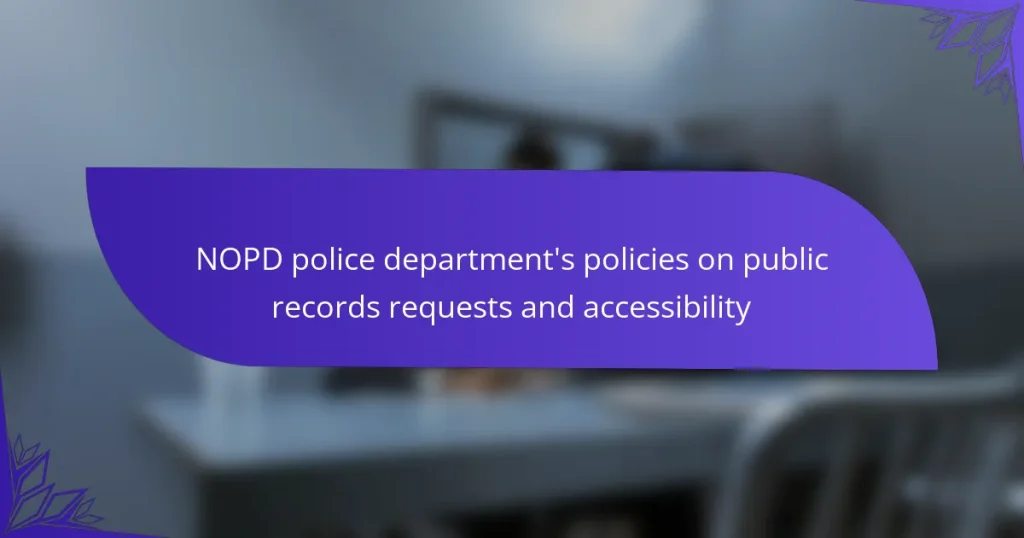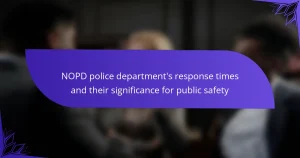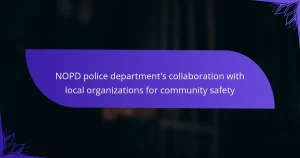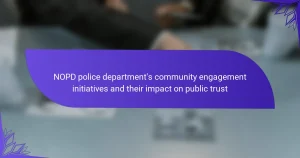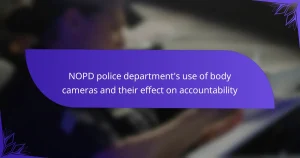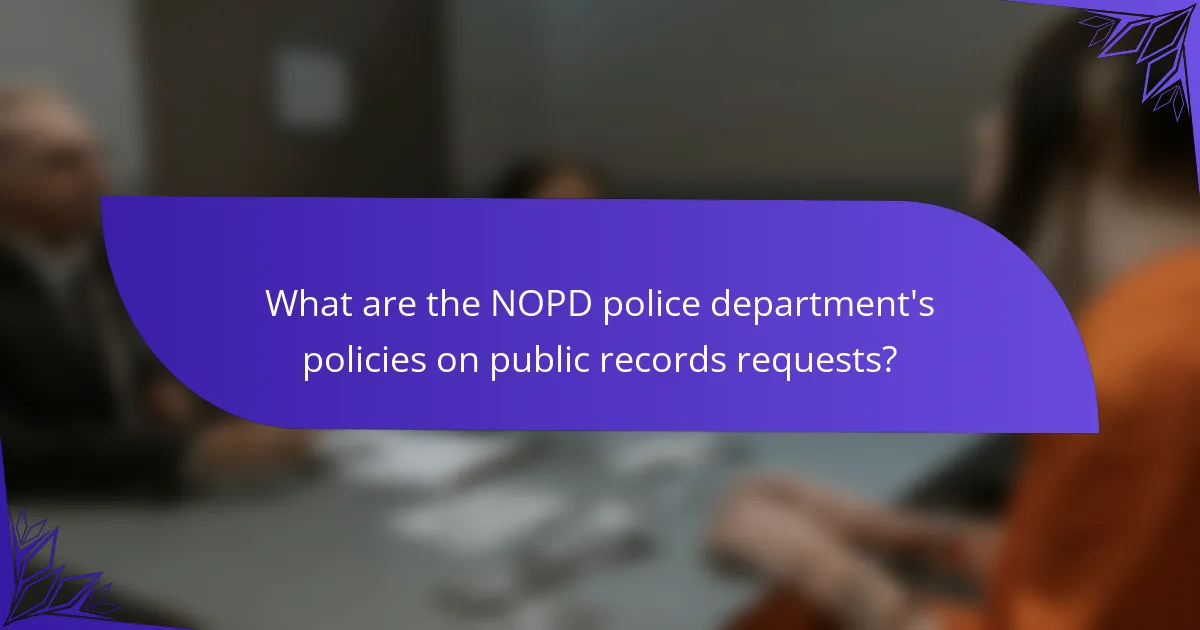
What are the NOPD police department’s policies on public records requests?
The NOPD police department’s policies on public records requests are governed by Louisiana’s Public Records Law. This law allows individuals to request access to public records maintained by the department. Requests can be made in writing or verbally. The department is required to respond to requests within three business days. If a request is denied, the department must provide a written explanation. Certain records may be exempt from disclosure due to privacy or security concerns. The NOPD also maintains a records division to assist with these requests. This division ensures compliance with state laws regarding public records access.
How do these policies ensure transparency and accountability?
NOPD’s policies on public records requests ensure transparency and accountability by mandating the release of information to the public. These policies require timely responses to requests for records, fostering openness. They establish clear guidelines for what information can be accessed, reducing ambiguity. The policies also include provisions for tracking requests, enhancing oversight. Regular audits of compliance with these policies further promote accountability. By allowing public scrutiny of police actions, these policies build trust within the community. The commitment to transparency is evident in the department’s proactive communication about available records. Overall, these measures collectively contribute to a more accountable police force.
What specific types of records can be requested under these policies?
Specific types of records that can be requested under these policies include incident reports, arrest records, and accident reports. Additionally, individuals can request police department policies, procedures, and training materials. Public records may also encompass communications, such as emails and memos, related to police operations. These records are accessible under state public records laws, which mandate transparency in government operations. The NOPD is required to comply with these laws to ensure public accountability.
What procedures must be followed to submit a public records request?
To submit a public records request, individuals must follow specific procedures outlined by the NOPD. First, requests should be made in writing. This can be done via email or by submitting a physical letter. Next, the request must clearly identify the records being sought. Providing details such as dates, subjects, or specific documents helps in processing the request efficiently.
Additionally, it is important to include the requester’s contact information. This ensures that the NOPD can communicate any updates or clarifications needed. There may be a fee associated with processing the request, which should be confirmed beforehand.
Finally, all requests should be sent to the designated public records officer within the NOPD. Following these steps ensures compliance with the policies regarding public records accessibility.
What are the timeframes associated with public records requests?
Public records requests typically have specific timeframes for response. In many jurisdictions, agencies must acknowledge receipt of a request within a few days. The actual response time can vary, often ranging from five to fifteen business days. Some requests may take longer if they involve extensive records or require legal review. Under the Louisiana Public Records Law, agencies are required to comply within a reasonable time. Failure to respond within the specified timeframe may result in legal consequences for the agency.
How quickly does the NOPD respond to requests for public records?
The NOPD typically responds to requests for public records within seven to ten business days. This timeframe is consistent with Louisiana’s public records law, which mandates timely responses. The department aims to provide access to records as quickly as possible while ensuring compliance with legal requirements. If additional time is needed, the NOPD will notify the requester of the delay and the reasons for it.
What factors can affect the response time for these requests?
Response time for public records requests can be affected by several factors. These factors include the complexity of the request, which may require more time to gather information. The volume of records requested can also impact the response time, as larger requests take longer to process. Staffing levels at the NOPD can influence how quickly requests are handled. Additionally, the need for redaction to protect sensitive information may extend the time required for a response. Legal requirements and compliance with state laws can also affect timelines. Finally, the method of submission, whether online or in person, can influence how quickly a request is processed.
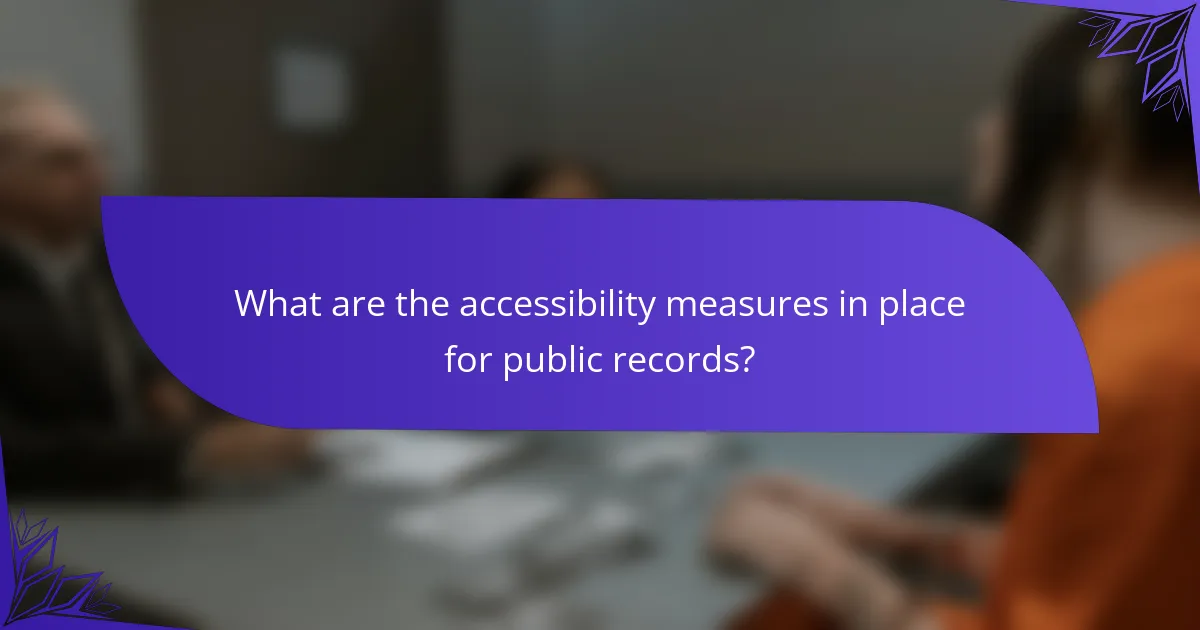
What are the accessibility measures in place for public records?
Accessibility measures for public records include online databases and physical access points. Many jurisdictions offer searchable online portals for easy access to records. These portals allow users to find documents without needing to visit a physical location. Additionally, public records offices often provide assistance to individuals with disabilities. This includes accessible facilities and materials in various formats. For example, records may be available in large print or audio formats. Transparency laws mandate that public records be accessible to all citizens. These measures ensure compliance with regulations such as the Americans with Disabilities Act.
How does the NOPD facilitate access to public records for all citizens?
The NOPD facilitates access to public records through a structured request process. Citizens can submit requests via the NOPD’s official website or in person. The department adheres to Louisiana’s Public Records Law, ensuring transparency. Requests are processed promptly, typically within three business days. The NOPD provides guidance on the types of records available. They also offer assistance for individuals unfamiliar with the process. This commitment to accessibility enhances public trust and accountability.
What accommodations are available for individuals with disabilities?
Accommodations for individuals with disabilities include accessible facilities, assistive technology, and modified communication methods. The NOPD provides wheelchair access to their buildings. They also offer sign language interpreters for individuals who are deaf or hard of hearing. Additionally, materials can be provided in alternative formats, such as large print or Braille. These accommodations ensure equal access to public records and services. Compliance with the Americans with Disabilities Act (ADA) mandates these provisions.
How can citizens access records online or through other digital means?
Citizens can access records online or through other digital means by visiting the NOPD’s official website. The website provides a dedicated section for public records requests. Users can submit requests electronically using the online form provided. Additionally, many records may be available for direct download in digital formats. This system enhances accessibility and efficiency in obtaining public information. The NOPD aims to comply with public records laws, ensuring transparency. Accessing records online reduces the need for in-person visits and expedites the request process.
What resources are available to assist with public records requests?
The resources available to assist with public records requests include official government websites, public records offices, and legal aid organizations. Official government websites provide guidelines and forms for submitting requests. Public records offices offer assistance in navigating the process and understanding what records are available. Legal aid organizations can provide support and advice on rights related to accessing public records. These resources ensure individuals have the necessary tools to effectively request and obtain public records.
Where can citizens find guidance on the public records request process?
Citizens can find guidance on the public records request process on the NOPD website. The website provides detailed instructions on how to submit requests. It includes necessary forms and contact information for assistance. Additionally, citizens can refer to state laws governing public records. These laws outline rights and procedures for accessing records. The NOPD also maintains a dedicated section for frequently asked questions. This section addresses common concerns related to public records requests.
What contact information is available for further assistance?
For further assistance regarding public records requests and accessibility, you can contact the NOPD Public Affairs Division. Their phone number is (504) 658-5858. You can also reach them via email at [email protected]. These contact details are provided for inquiries related to the NOPD’s policies and procedures.
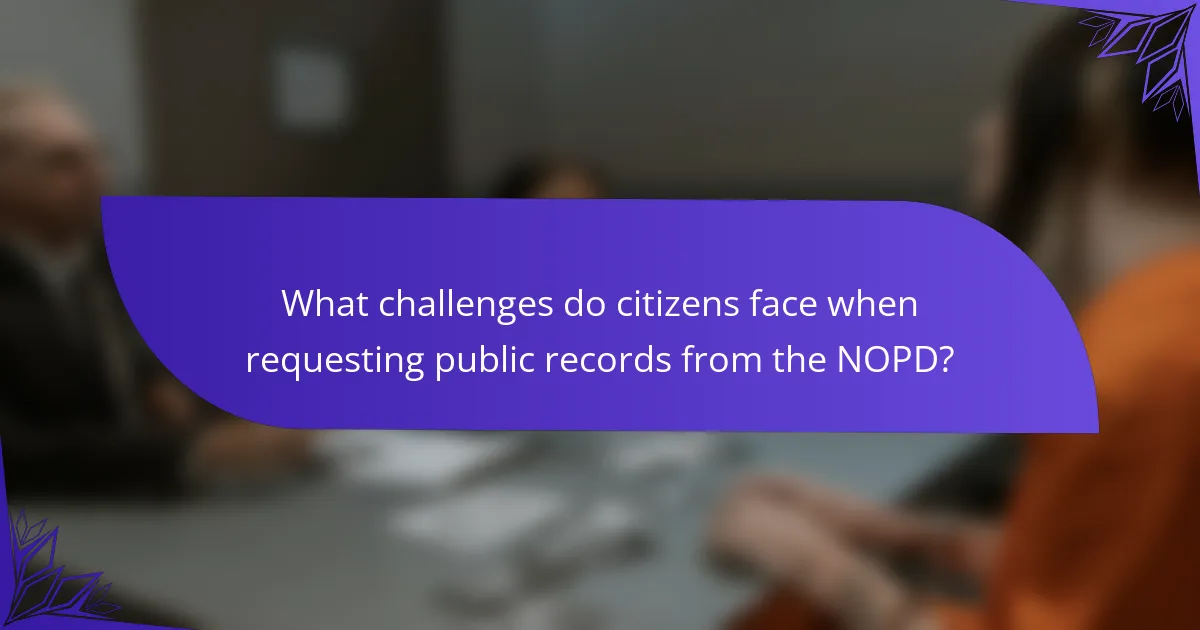
What challenges do citizens face when requesting public records from the NOPD?
Citizens face several challenges when requesting public records from the NOPD. One major issue is the complexity of the request process. The NOPD may have specific forms and procedures that can be confusing. Additionally, response times can vary significantly, leading to delays. Some requests may also be denied due to exemptions under Louisiana law. This can frustrate citizens seeking transparency. Furthermore, there may be costs associated with obtaining records, such as copying fees. Limited staff resources can also hinder timely processing of requests. These factors collectively create obstacles for citizens trying to access public records.
What common issues arise during the public records request process?
Common issues during the public records request process include delays in response times. Agencies often take longer than the legally mandated timeframe to fulfill requests. Another issue is the potential for incomplete records being provided. This can occur due to miscommunication or inadequate record-keeping practices. Additionally, requesters may face excessive fees for obtaining records. These fees can discourage individuals from pursuing their requests. Furthermore, there can be a lack of clarity in the information provided regarding the request process. This can lead to confusion about how to submit a request or what information is needed. Lastly, some records may be improperly withheld due to claims of exemptions that may not apply. These issues highlight the challenges faced by individuals seeking public records.
How can individuals overcome these challenges?
Individuals can overcome challenges regarding NOPD’s public records requests by understanding the process thoroughly. Familiarizing themselves with Louisiana’s Public Records Law is crucial. This law provides guidelines on how to request records and the timelines involved. Individuals should also prepare clear, specific requests to avoid confusion. Utilizing NOPD’s official website can provide necessary forms and contact information. Engaging with community advocacy groups can offer additional support and resources. Lastly, individuals can follow up persistently on their requests to ensure timely responses.
What best practices should citizens follow when submitting public records requests?
Citizens should follow specific best practices when submitting public records requests. First, they must clearly identify the records they seek. Providing detailed descriptions improves the chances of a successful request. Second, citizens should submit requests in writing. Written requests create a formal record of the inquiry. Third, they should include their contact information. This allows agencies to reach out for clarification or to provide the requested records. Fourth, citizens should be aware of their rights under public records laws. Understanding these rights empowers them during the request process. Fifth, they should be patient and follow up if necessary. Many agencies have timelines for responses, and following up can ensure requests are processed. Lastly, citizens should be respectful and professional in their communication. A courteous approach fosters better relationships with public agencies.
How can clarity and specificity improve the chances of a successful request?
Clarity and specificity enhance the chances of a successful request by reducing ambiguity. Clear requests outline exactly what information is needed. Specificity helps the NOPD identify relevant records quickly. This leads to quicker responses and fewer misunderstandings. For instance, stating “I request the incident report from March 1, 2023, related to case number 12345” is more effective than a vague request. Clear and specific requests also help ensure compliance with public records laws. According to the National Freedom of Information Coalition, precise requests are more likely to receive timely and accurate responses.
What tips can help ensure timely responses from the NOPD?
To ensure timely responses from the NOPD, submit clear and concise requests. Specify the information needed and include relevant dates. Use the proper channels for requests, such as the NOPD’s official website. Follow up politely if you do not receive a response within a reasonable timeframe. Providing contact information can facilitate communication. Familiarize yourself with the NOPD’s public records policy to understand response times. Keeping requests focused can reduce delays. Document your interactions for reference if needed.
The main entity of this article is the NOPD police department’s policies on public records requests. The article outlines how these policies are governed by Louisiana’s Public Records Law, detailing the procedures for submitting requests, types of records available, and the timeframes for responses. It emphasizes the importance of transparency and accountability in police operations, as well as accessibility measures for individuals, including those with disabilities. Additionally, the article addresses common challenges citizens face when requesting records and offers best practices to enhance the likelihood of successful requests.
